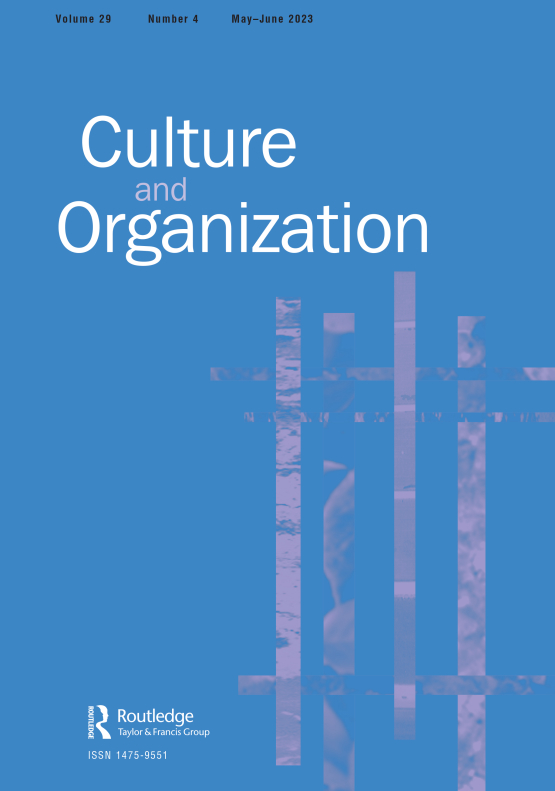Submit a Manuscript to the Journal
Culture and Organization
For a Special Issue on
The Good, the Bad, and the Ugly - Representation of leadership in popular culture
Abstract deadline
01 March 2024
Manuscript deadline
15 September 2024

Special Issue Editor(s)
Malgorzata Ciesielska,
Sheffield Hallam University
[email protected]
Sylwia Ciuk,
Oxford Brookes University
[email protected]
Anja Louis,
Sheffield Hallam University
[email protected]
Doris Schedlitzki,
London Metropolitan University
[email protected]
The Good, the Bad, and the Ugly - Representation of leadership in popular culture
This proposed Special Issue focuses on two intersecting topics that are at the heart of this journal’s core focus on critical, interpretive explorations of organisations and culture: Leadership and Popular Culture. Whilst both of these topics have been previously examined by individual contributions published in the journal, this intersectional perspective is new - both to the journal and more widely to the field of Organization Studies.
We invite original papers to be published as part of a special issue. Our aim is to forge interdisciplinary links between those working in Cultural/Media Studies and Leadership Studies. In line with the dominant understanding in culture/media studies we see popular culture as a key mediator and catalyst for social change and control, and recognise its potential to advance our understanding of The Good, the Bad, and the Ugly of Leadership.
As a response to global concerns in leadership, in which power, diversity, individualism and heroification have been brought into sharp focus, this special issue will examine the way in which structures of power play out in pop culture texts, thus providing an important interdisciplinary intervention.
KEY GAPS & RESEARCH QUESTIONS:
It has long been recognised that culture and leadership are tightly intertwined, profoundly influencing organisational life. There are markedly different approaches and traditions to studying the two phenomena separately as well as their interconnectedness (Bezio & Yost, 2018). Traditionally the role of leadership in occupational and organisational cultures has been discussed in relation to Schein’s (2004) model of culture, which sees culture as a variable within organisations that can and ought to be managed in order to align employees’ behaviours and attitudes to the corporate agendas. Leaders are here seen to adopt the key role of cultural change agents and cultural enforcers, creating, maintaining and changing organisational cultures to improve the organisation’s performance (Schein, 2004). In contrast, when seeing culture as something naturally evolving and as systems of ‘common symbols and meanings’ (Alvesson, 2011: 153), leadership is researched as a symbolic activity, engaging in sense and meaning making (Smircich and Morgan, 1982).
Popular culture, including visual fiction (e.g. Holstein and Rantakari, 2023; Holt and Zundel, 2014; Panayiotou and Kafiris, 2011), has traditionally been associated with pop fiction, movies and TV series, more recently social media and gaming. It has been theorised in terms of its narrative, aesthetics, and its role as a mediator of cultural identity. It has long been argued that it offers substantial potential to advance our understanding of organisational life (e.g. Bell, 2008, Śliwa et al, 2013) in its diversity (Bell & Sinclair, 2016; Mavin, et al., 2016). As a research context, popular culture has afforded leadership scholars rich narratives to explore deeply entrenched leadership images and discourses (Biehl and Satama, 2023; Urick, 2021) . From a practice perspective, we can further see popular culture at times being based on leadership practices in real organisations and in turn influencing leadership practices (Gilani et al., 2020). Moreover, the increased interest in social media as a context for the study of leadership has challenged the traditional leader-follower notions embedded in organisational hierarchies. Popular culture examples of leadership have also been used in leadership and management education serving as a reflective mirror and possibly influencing future leaders (Callahan et al., 2007; Library, 2022; Bezio, 2022; Stead and Elliott, 2019) and rebuilding leadership theory (Śliwa, 2023).
Yet, critical evaluations and analyses of the intersection of popular culture and leadership, and their exploratory and explanatory potential, are still reasonably rare. This Special Issue intends to fill this gap.
Looking to Publish your Research?
Find out how to publish your research open access with Taylor & Francis Group.
Choose open accessSubmission Instructions
We invite both conceptual and empirical papers that may include but are not limited to critical analyses of:
- How does popular culture shape/influence leadership imagery?
- How do fictional depictions of leadership and leaders further our understanding of leadership in organisations?
- In what way do new popular culture outlets like social media or video games influence leadership narratives and practices?
- How is the cross section of diversity and leadership represented in popular culture? For example - How is minority leadership depicted in popular culture? What are the representations of Women leaders in popular culture?
- How does popular culture represent and challenge dark, toxic and unsustainable leadership practices? How does popular culture represent the consequences of bad leadership in organisations? How can the study of popular culture advance our understanding of dark leadership?
- How are Leaders-followers dynamics represented in popular culture? What can we learn from the critical evaluations of leader-follower dynamics in popular culture, and especially social media?
- How do less traditional popular culture outlets like social media, games, ted talks portray good / bad leaders and self-made online leadership “gurus”?
- Historical and/or particular cultural or national analysis of changes of good/bad leadership traits across popular culture outlets. Narratives, tropes and characters surrounding the concept of leadership in popular culture
- How do actual or inspiring leaders use popular culture to inspire, gain influence, motivate?
- Critical Analysis of use of popular culture in leadership training and development/education
- How can we use depictions of dark leadership in popular culture in management learning and education?
- How does popular culture influence career decisions to move to leadership roles?